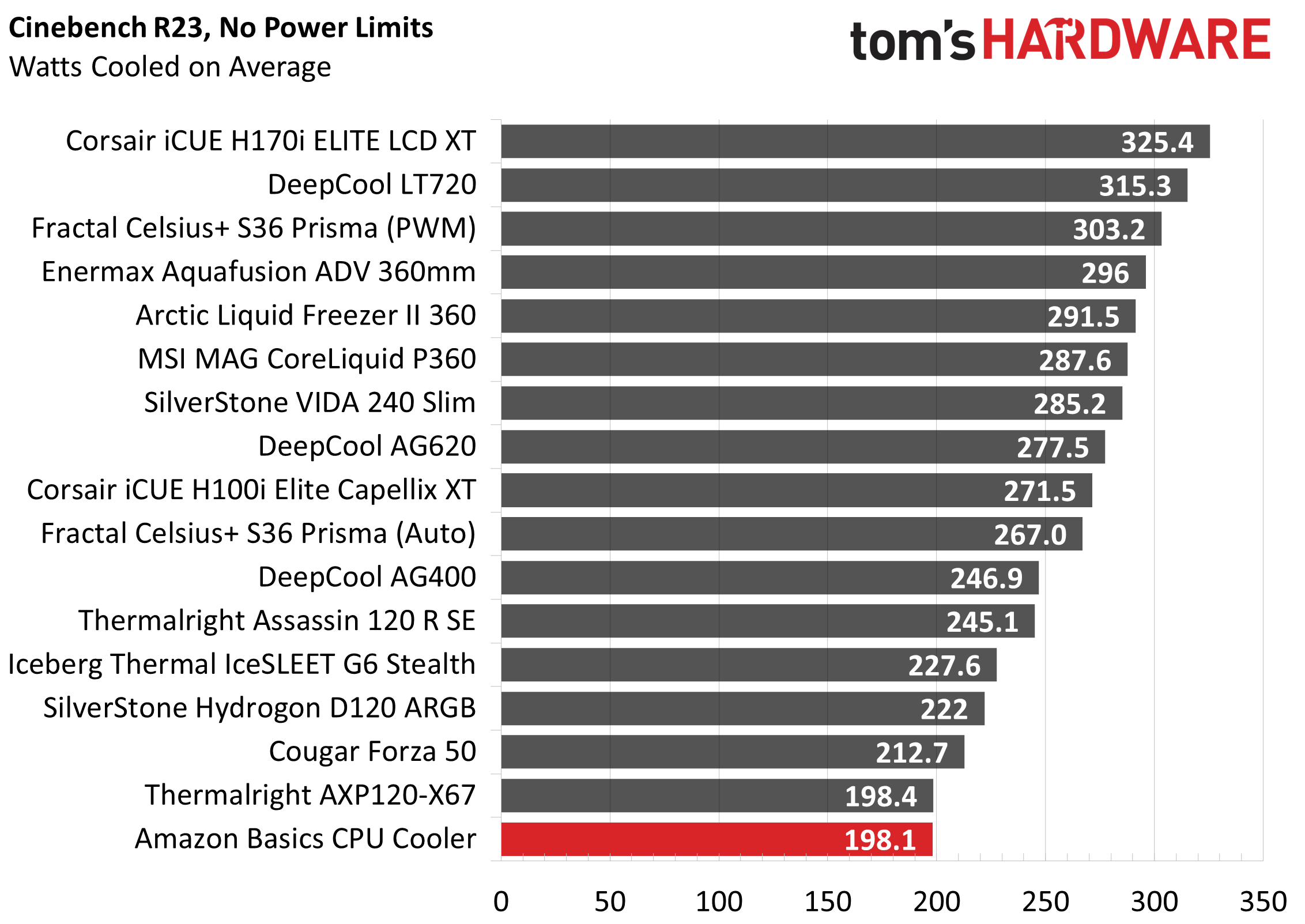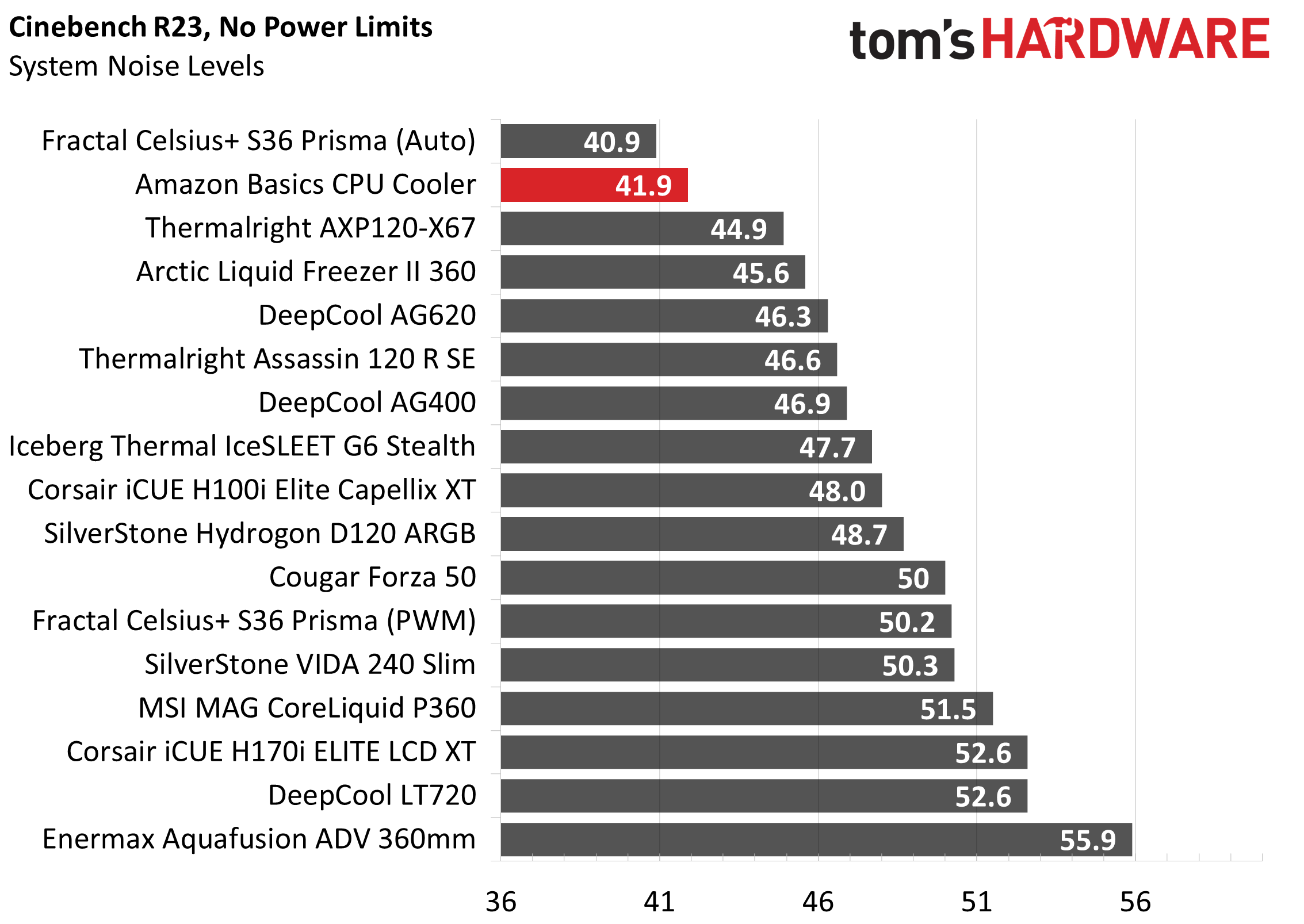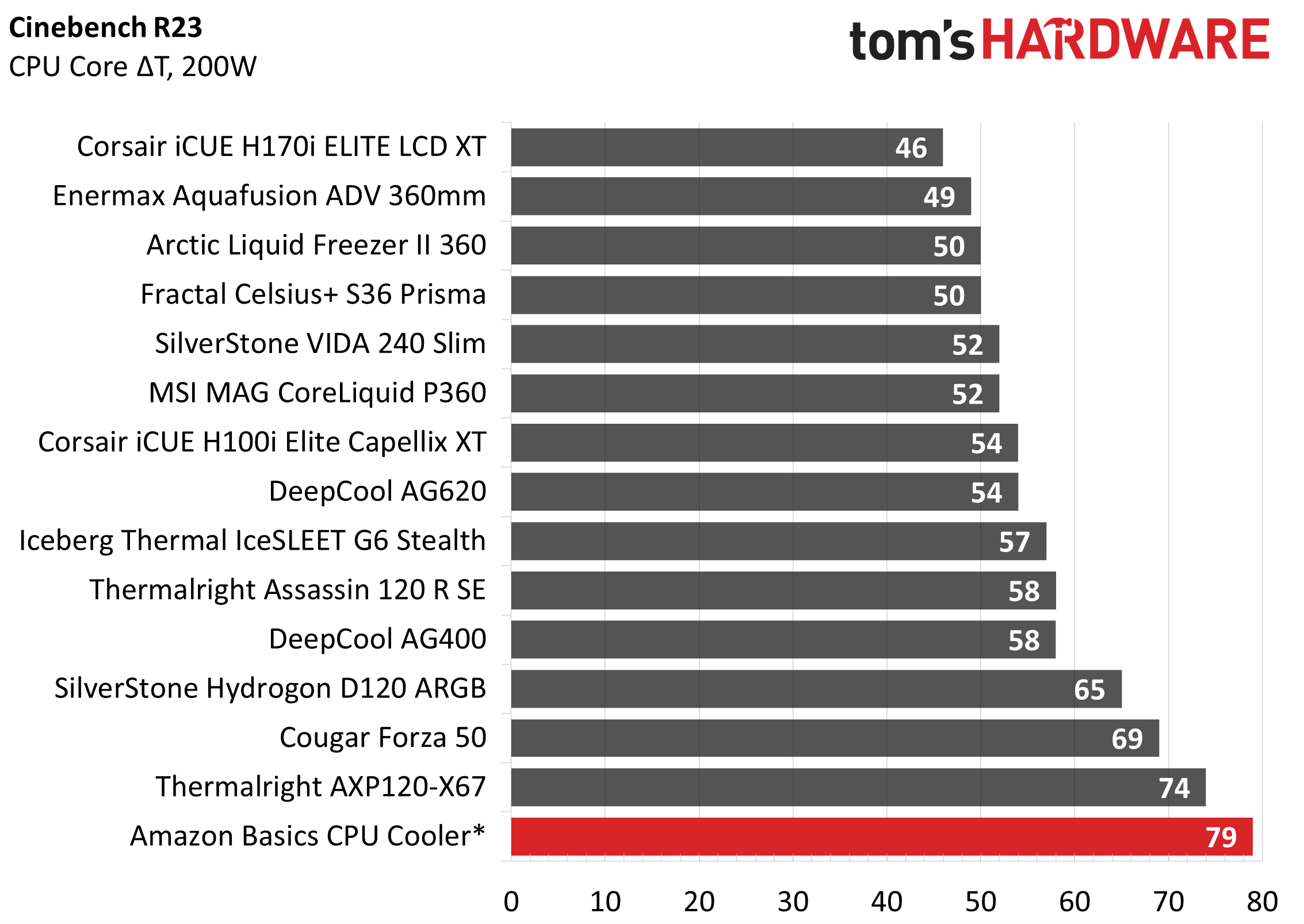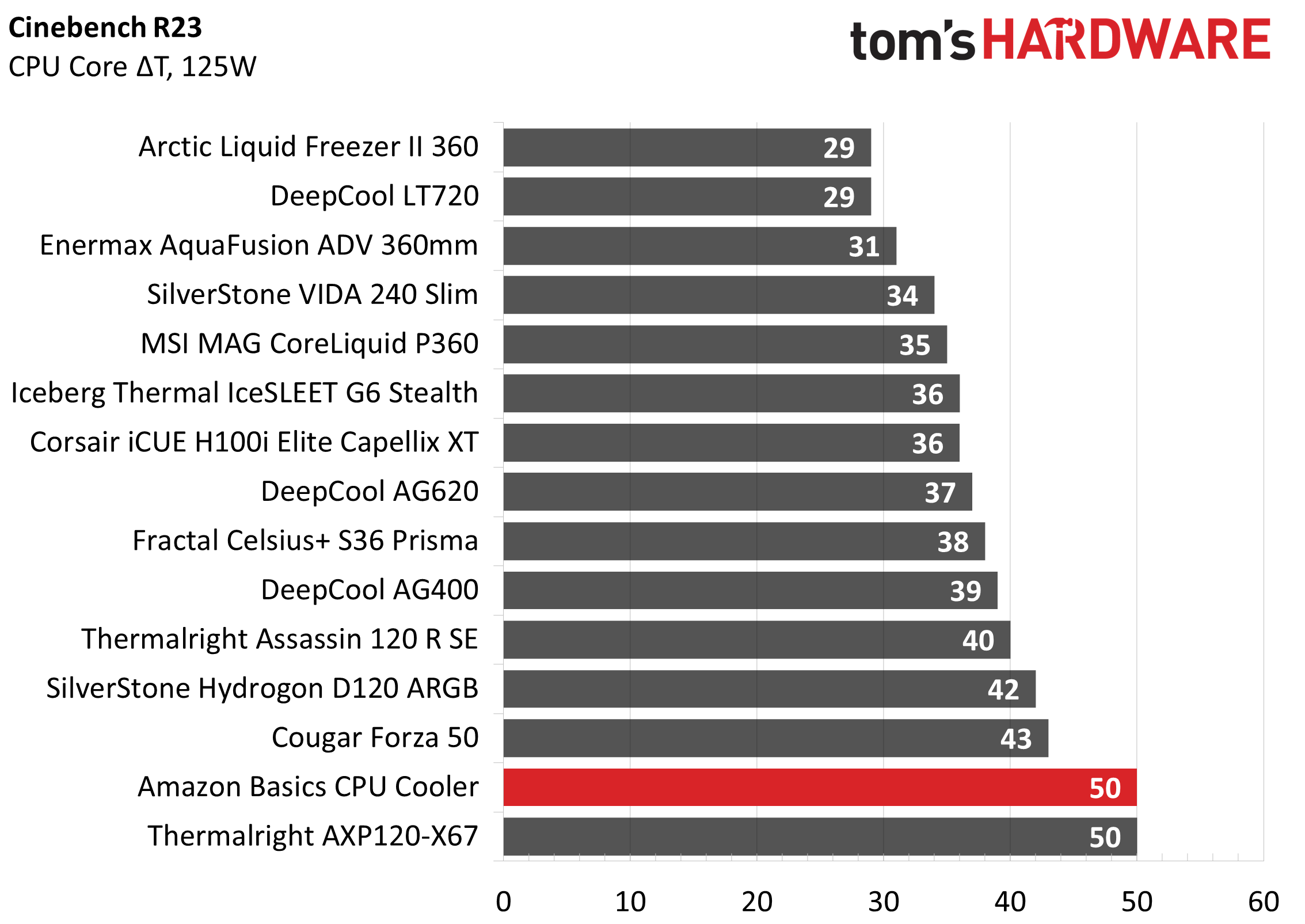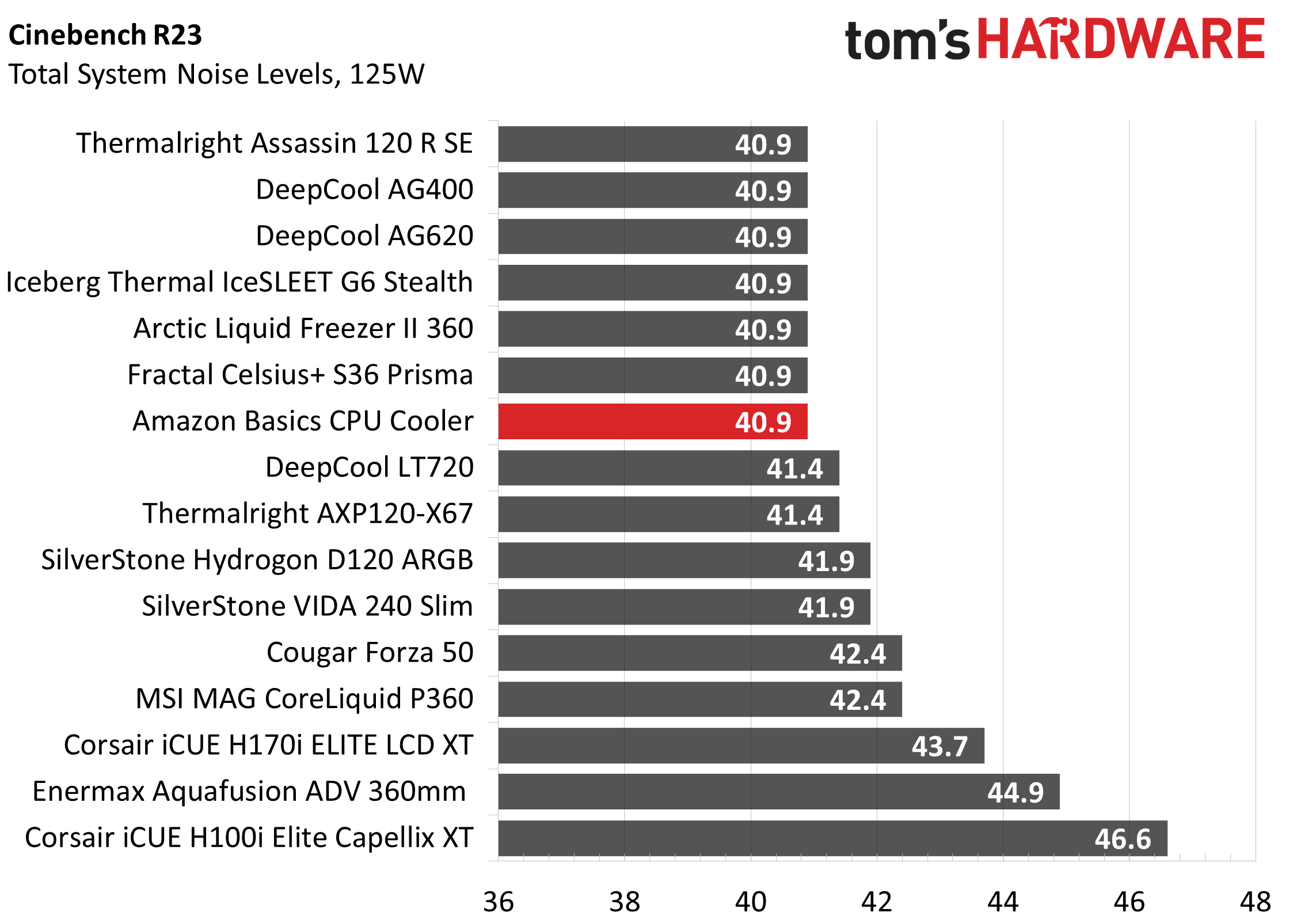Why you can trust Tom's Hardware
No Power Limits Cinebench Results
With Intel's i9-13900K pushing speeds of 5.5 GHz or higher, even the strongest of coolers hit TJ Max while running Cinebench R23 and other demanding scenarios. As the 13900K is designed to aim for its top safe temperature, we’ll be comparing the overall noise levels and total watts cooled instead.
The results below are for a 10-minute testing run. But to be sure that was sufficiently long to tax the cooler, we also retested both Thermalright’s Assassin X 120 R SE and DeepCool’s LT720 with a 30-minute Cinebench test. The results didn’t change much at all with the longer test: The average clock speeds maintained dropped by 29 MHz on DeepCool’s LT720 and 31 MHz on Thermalright’s Assassin X 120 R SE. That’s an incredibly small 0.6% difference in clock speeds maintained, a margin of error difference that tells us that the 10-minute tests are indeed long enough to properly test the coolers.
Because of the difficulty of cooling the i9-13900K in this workload, I feel the best way to compare coolers here is to record the average power consumption of the CPU. As Cinebench R23’s multi-core benchmark will push coolers to their limits, it’s also a great test for recording the worst-case scenario of fan noise levels.
When it comes to total cooling capacity, the Amazon Basics air cooler performed true to it’s name and only provided basic cooling capacity. At 198W total, you’re not going to win any overclocking competitions with this cooler – but it’s plenty sufficient for most common tasks, and should have no problems taming your average Core i5 or Ryzen 5 CPU.
The average noise levels of all coolers tested is in this test 48.7 dBA, and many coolers will run loudly at full speeds. That’s not a problem with the Amazon Basics cooler, which runs quietly in all scenarios. With total system noise measuring at only 41.9 dBA, this is the second-quietest CPU cooler I’ve tested. Only Fractal’s $200 360mm AIO was quieter.
You might notice that our noise charts start at 36 decibels, which is the noise floor of our testing environment. This makes 36dB our baseline measurement, as we’re unable to measure noise levels below this threshold. Keep in mind that noise measurements are logarithmic, meaning the differences between the noise levels of the coolers will be more perceptible than these graphs would suggest.
200W Cinebench Results
The Amazon Basics CPU cooler doesn’t technically pass our 200W test. In our default testing environment with a 23C ambient temperature, it’s only able to cool an average of 198W, but it’s still not bad considering the price.
Get Tom's Hardware's best news and in-depth reviews, straight to your inbox.
Because of how close this cooler came to passing this test, I wanted to see if a lower ambient temperature would allow the cooler to “pass” this test. It was able to get it to handle 200W, but only when the ambient was 20C or lower. So if you want to drive this cooler to its limits, make sure your climate control is also on point.
125W Cinebench Results
The lowest power limit I test at is 125W, mainly because this is also the lowest level where I can reliably measure noise measurements using Cooler Master’s HAF 700 Berserker. Lower power consumption causes the noise of many CPU coolers to fall below the noise created by the system fans (even while restricted to 35% speed).
Thermal results aren’t very important in this scenario, because even the weakest SFF coolers should be able to cool the CPU below TJ Max in this test. The thermal results of the Amazon Basics cooler here are not impressive at 50C over ambient. Noise levels are more important for the evaluation of performance in this scenario. The results here are excellent for the Amazon Basics air cooler, tied with our best results for low noise levels.
Conclusion
The Amazon Basics CPU cooler is true to it’s name, offering just 198W of cooling capacity when paired with Intel’s i9-13900K. While that’s not chart topping cooling capacity, it’s more than enough for the needs of common users who aren’t running a Core i9 and don’t plan to overclock. And the cooler runs whisper silent in all workloads.
If you’re looking for quiet cooling performance that doesn’t cost much or take up much space in your case, the Amazon Basics CPU Cooler will provide what you need. Just know that it’s not the easiest cooler to install.
MORE: How to Buy the Right CPU Cooler
MORE: How to Check CPU Temperature
MORE: All CPU Cooling Content

Albert Thomas is a contributor for Tom’s Hardware, primarily covering CPU cooling reviews.
-
-Fran- Haha! Nice job, Albert!Reply
I'd love to see how this one compares to the Vetroo V5 TBH, but it does seem like it's not a terrible buy; quite competitive in fact.
That fan though... The plastic used gives me the feeling it will crackle/break rather soon when exposed to heat. I wish you could test that theory, but it gives me that feeling. Maybe I'm wrong. In any case, it's easy to swap if it breaks or isn't enough.
Regards. -
PlaneInTheSky So the Amazon cooler cools the exact same as the Thermalright but it's quieter and it's 30% cheaper.Reply
Nice job. -
PlaneInTheSky Reply
I think the argument is that it is simple because it's clear how installation works. But it's not that easy to do.evdjj3j said:So ease/difficulty of installation is both a pro and a con?
Kind of like how riding a bicycle is a simple to understand concept, but it's not that easy to do.
https://i.postimg.cc/fb9Jn4xj/MV5-BODlh-Zjc5-Y2-Qt-MWFj-Ny00-OWUz-LTgy-ZTQt-OTgz-NTI1-OGIz-Mm-U1-Xk-Ey-Xk-Fqc-Gde-QXVy-Mz-U0-NTc0-MDY-V1.jpg -
evdjj3j ReplyPlaneInTheSky said:I think the argument is that it is simple because it's clear how installation works. But it's not that easy to do.
Kind of like how riding a bicycle is a simple to understand concept, but it's not that easy to do.
https://i.postimg.cc/fb9Jn4xj/MV5-BODlh-Zjc5-Y2-Qt-MWFj-Ny00-OWUz-LTgy-ZTQt-OTgz-NTI1-OGIz-Mm-U1-Xk-Ey-Xk-Fqc-Gde-QXVy-Mz-U0-NTc0-MDY-V1.jpg
Then it's a con. -
PlaneInTheSky Replyevdjj3j said:Then it's a con.
It's both a plus and a con. The process is simple, you don't need a degree to understand the simple concept of riding a bicycle. So that's a plus. But actually doing it is not that easy. So that's a con. -
Amdlova I have this cooler is the same coolers master 412r. 200w? What kind of voodoo you guys use?Reply
My little fellow here gives me Temps 90 degree celcius. Cheap do the work but I can't belive 200w :) max 125w before goes to the sun
